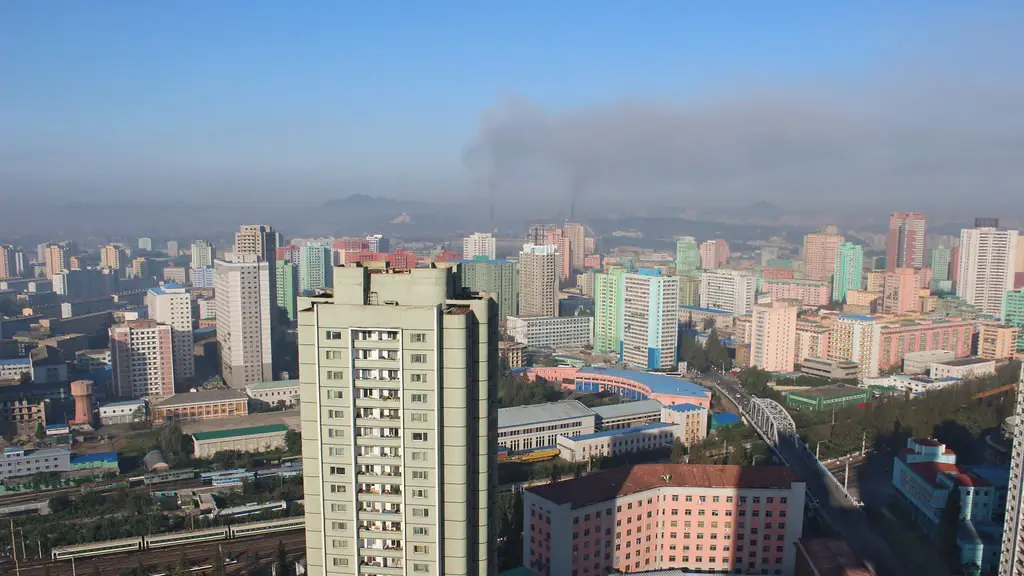China and North Korea
China and North Korea are two countries that share a very close relationship, both historically and in the present day. North Korea has always been heavily dependent on China for trade, military support, and diplomatic relations. This close relationship has led to speculation that China may be considering a military invasion of North Korea if tensions between the two countries were to worsen significantly.
In recent years, North Korea has tested nuclear weapons and ballistic missiles, in violation of international sanctions, which has strained diplomatic ties between China and North Korea. Despite increasing tensions, China has maintained its support for North Korea on the world stage, at times vetoing attempts by the United Nations to impose further sanctions. This has caused some to speculate that China may be planning an invasion of North Korea in order to gain control of its nuclear arsenal.
Despite these speculations, the Chinese government has repeatedly denied any plans for a military invasion of North Korea. In an effort to defuse tensions in the region, China has proposed a “dual suspension” strategy. This strategy calls for North Korea to suspend its nuclear and missile programs, in exchange for a suspension of US-South Korean military drills. This strategy has been viewed by China as a way to ease tensions between North Korea and the Western powers, thus reducing the possibility of a Chinese invasion of North Korea.
Experts have noted that while a Chinese invasion of North Korea is possible, it is highly unlikely due to the potential consequences. A Chinese invasion of North Korea would likely lead to an uprising in the country, creating a massive humanitarian crisis in the region. Additionally, an invasion would put the Chinese government at odds with the United Nations and could cause massive economic disruption. Furthermore, a Chinese invasion would likely draw the ire of the United States, leading to a further escalation of tensions in the region.
Ultimately, it is clear that a Chinese invasion of North Korea is not a viable option for either China or North Korea. While speculation about a Chinese invasion may be intriguing, the potential consequences are too severe for either country to consider. For now, it seems that the best option for both countries is to focus on finding diplomatic solutions to the current tensions.
Effect of Chinese Economic Pressure
China is seen as the only major economy willing to support North Korea. This has made China an indispensable partner for North Korea, granting the country economic leverage over North Korea. In recent years, China has increased its pressure on North Korea by suspending coal shipments and restricting other exports to the country. This has had a serious impact on North Korea’s economy, and has been seen as an indirect way for China to pressure the country into making concessions.
Despite the increased pressure, North Korea has continued to develop its nuclear arsenal and test its ballistic missiles. This has caused some experts to believe that Chinese economic pressure has been ineffective in stopping North Korea’s pursuit of nuclear weapons. This presents a serious problem for China, as the tension between North Korea and the West continues to increase and could lead to a potential military confrontation in the region.
However, some experts are optimistic that the Chinese economic pressure will eventually cause North Korea to make concessions. The Chinese government has an interest in avoiding further escalation of tensions on the Korean Peninsula and believes that maintaining economic pressure on North Korea may be the best way to do so. The Chinese government also hopes that economic pressure can convince North Korea to return to the negotiating table, while avoiding the possibility of a military confrontation in the region.
It is clear that Chinese economic pressure is a key factor in the ongoing conflict between North Korea and the West. Despite the increased pressure, North Korea has yet to make any serious concessions. How this situation resolves itself will be determined by the actions of the Chinese government and its ability to convince North Korea to soften its stance on nuclear weapons.
USA’s Response
The United States has been a major player in the tensions between North Korea and the West. The Trump administration has been outspoken in its criticism of North Korea, and has imposed a number of sanctions on the country in an effort to bring it back to the negotiating table. The US has also sent a form of military aid to South Korea, in an effort to deter North Korea from further aggression.
However, the US has also stated that they do not support a Chinese invasion of North Korea. US Secretary of State Mike Pompeo has stated that the US would oppose any attempt by China to use force in North Korea. The US government has also encouraged China to use diplomatic and economic pressure to convince North Korea to abandon its nuclear weapons program.
That being said, the US has also made it clear that it will not remain idle if the situation in North Korea continues to worsen. The Trump administration has stated that it is prepared to take military action if North Korea does not denuclearize. This has raised concerns among some experts, who fear that the US might be preparing to use military force to prevent a Chinese invasion of North Korea.
In light of this, it is clear that the US is willing to take a hard stance on North Korea, even as it discourages a Chinese military invasion. This indicates that the US is not only interested in protecting its interests in the region, but also in preventing a potential humanitarian disaster in the event of a Chinese invasion of North Korea.
International Community’s Reactions
In response to the tensions between China and North Korea, the international community has been largely supportive of diplomatic solutions. Leaders from countries such as Japan, South Korea, and the United Kingdom have encouraged negotiations and dialogue between the two countries. The United Nations has also encouraged China and North Korea to seek diplomatic solutions and to avoid any sort of military confrontation.
At the same time, some countries such as the United States have been less supportive of negotiations. The US has accused North Korea of stalling for time and has maintained economic sanctions and military drills in the region. This has raised concerns among some international leaders, who fear the US may be willing to take military action if negotiations break down completely.
Despite this, the international community remains committed to finding a diplomatic solution to the conflict. A number of international summits have been held in an effort to negotiate a peaceful resolution, and there is hope that further dialogue may lead to an agreement. For now, it seems that the best chance for a peaceful resolution is for China and North Korea to resume negotiations and find a way to defuse the escalating tensions in the region.
Conclusion
Given the potential consequences of a Chinese invasion of North Korea, it is clear that the prospect of such an invasion is unlikely. China has repeatedly denied any such plans, and is instead focusing on finding diplomatic solutions to the tensions in the region. China has also implemented economic sanctions on North Korea in an effort to convince the country to abandon its nuclear weapons program. Meanwhile, the US has taken a hard stance on North Korea and is prepared to take military action if negotiations fail.
The international community is supportive of diplomatic solutions and remains committed to finding a peaceful resolution to the conflict. It is now up to China and North Korea to come to an agreement to defuse the tensions in the region and avoid a potential military confrontation. For now, all that can be hoped for is that both countries will recognize the consequences of a Chinese invasion and agree to resume negotiations.
Options for North Korea
North Korea has very few options when it comes to averting a potential Chinese invasion. The country’s military capabilities are limited and its economy is heavily reliant on China for trade and resources. This has left North Korea in a precarious position, as it is dependent on China for its economic and military needs, yet unable to rely on China for protection from a Chinese invasion.
In order to prevent a Chinese invasion, North Korea has sought to strengthen its ties with the international community. The country has held a number of high-profile diplomatic meetings with other countries in an effort to bolster its reputation in the international community and reduce the chances of a Chinese invasion. North Korea has also sought to improve its ties with the United States and South Korea, both of which are seen as key allies in the region.
Ultimately, North Korea hopes to convince China to back off and abandon any plans for a military invasion. North Korea must continue to strengthen its diplomatic ties and make concessions on its nuclear weapons program in order to reduce the chances of a Chinese invasion. By doing so, North Korea can ensure that it can continue to develop its economy and avoid a potential humanitarian disaster.
Security Implications
If China were to invade North Korea, the repercussions would be felt far and wide. The political and security implications of such an action would be immense, and could potentially have far-reaching consequences for the region. A Chinese invasion would undoubtedly lead to a massive humanitarian crisis, as thousands of people would be displaced from their homes. Additionally, it would lead to further destabilization of the Korean Peninsula, as well as increased tensions between China and the Western powers.
In addition to the political implications, a Chinese invasion of North Korea would also have a major economic impact. North Korea’s economy is heavily dependent on trade with China, and a Chinese takeover of the country would lead to economic disruption on a massive scale. This would be felt not just in North Korea, but in the entire region, as the Chinese economy is closely intertwined with many other countries in the region.
Lastly, a Chinese invasion of North Korea could also have security implications. This could lead to an increase in military activity in the region, as the United States and its allies may feel the need to respond to the situation. This could potentially lead to a military conflict between China and the US, which could have devastating consequences for the entire world.
While speculation about a Chinese invasion of North Korea is interesting, the potential ramifications of such an action are too severe for either country to consider. In light of this, it is clear that a Chinese invasion of North Korea must be avoided at all costs, and diplomatic solutions must be found in order to diffuse the situation.





